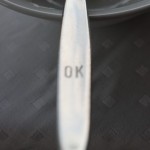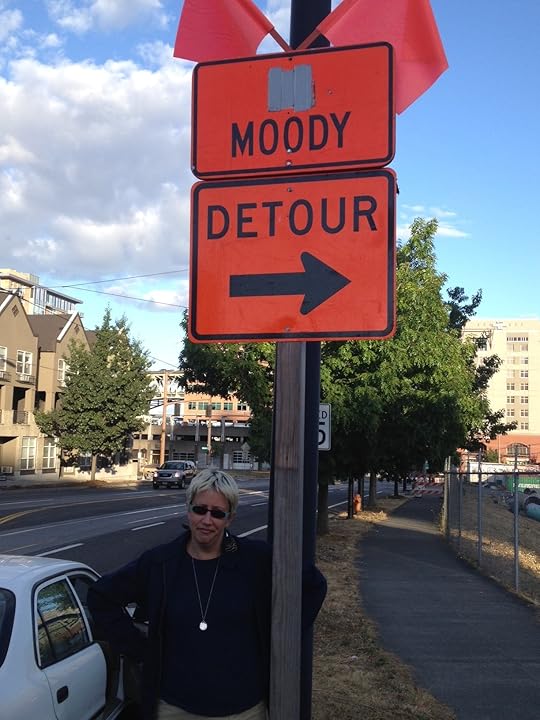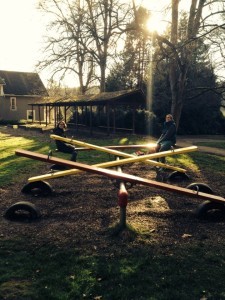Jen Violi's Blog, page 3
February 13, 2014
Story Touchstones: On Seesaws, Sisters, & Getting Back to the Point
Sometimes I get into such a good writing rhythm. Day after day, I go to my writing desk, the words and pages flow, and I get that draft done.
Oh, the good old days.
In more recent days, I’ve felt like two of the middle Von Trapp sisters in the Sound of Music, gracefully running away from my work in progress. I flit. I float. I fleetly flee. I fly. So long, farewell, novel. I simply have to get away from you and go to bed.
But I want to finish that novel, and I will finish it, and in order to do that, I have to keep coming back to the point. A reminder I got when a week ago, my little sister came to visit.
Before she arrived, I had been having one of those weeks, well maybe one of those months. Illness, angst, squabbles, facing hard truths, relationship muck, feeling stuck and off-kilter. Basically, I lost my joy. Who else is glad January is over?
The good news is that my sister’s visit got me unstuck and on-kilter again.
Although we’re different women who have taken our lives in different directions, I love the ways we connect and intersect, how I can laugh harder and deeper with her than many people in my life, and how she reminds me of where I come from.
This made me think of stories, and how when we get off track, we need precisely that kind of reminder. How that reminder can balance us when we float up into distraction as well as when we plunge into the dirt and get stuck.
Conveniently enough, during her visit, my sister and I rode a seesaw.
I love this picture of us seesawing after a winter picnic in the park, especially that the sun seems to be giving me an extra magic light-jolt. Who couldn’t use one of those?
Of course, like most people, I don’t always want to be reminded of earlier versions of myself—the awkwardness, the righteous indignation, the fear, the overcompensating. Often, we deliberately choose to come from somewhere other than those less-than-awesome places we started. That’s a good thing. It’s called growing up.
At the same time, remembering where we come from, at the deepest level, can be so edifying. With my sister, I remembered the self who ground up Necco Wafers in water and made Pony Juice for a stable full of My Little Ponies, who stayed up late playing 20 questions, who got lost in books, who enjoyed cheesy movie marathons and eating Rice Krispie treats right out of the pan, who designed custom holiday cards complete with original poetry for people I loved—a wildly creative, fun-loving, curious, big-hearted creature. Those are all points and sources I can get behind, and remembering them balanced me. They also gave me back my joy.
Same goes for my current novel. Just this past weekend, I asked myself why I got into this mess in the first place.
And I remembered. It’s about magic and freedom and taking flight. Oh yeah.
Guess what happened next? I started writing again. And I liked it. Hallelujah!
If you, too are flitting and floating and fleetly fleeing your current project, if you crave your own Hallelujah, why not take a moment to come back to the point?
Ask yourself:
Why did I start writing this in the first place?
Why does it matter?
What’s at the heart of this work?
Is this work for the sake of someone or something? Who or what?
Let your answer come—in writing, in collage, in some other form of art
If for some reason, the answer feels muddled or hazy or shaky, that’s helpful information, too. Now’s your opportunity to uncover that point and course-correct.
Once you identify the point, post it somewhere on or near your writing desk. Let it edify you and lead you back to the pen, the desk, this story that matters.
Let your point sit across from you on the seesaw and keep you steady, and please, above all, enjoy the ride.
Thank you so much for reading. You might notice that I don’t have a space for comments, but I’m certainly open to conversation about what’s written here. If you’re so inspired, feel free to start a conversation with me via the contact form on the homepage of this site.
June 20, 2013
Fauxstalgia: At the Bottom of the Well
by guest contributor, Veronica Martin*
In Turkey there is a hotel on the edge of summer, on the edge of the sea, that seems to hold its nostalgia as if it is holding its breath.
The Kismet’s walls are covered in black and white photographs of former clients – royalty, movie stars, politicians, writers –, a parrot wheezes in the corner and, if you have the chance to stay there in May, it holds the particular delight of lodging in the faded grandeur of a formerly haute hotel during its off season. The place agreed with me terribly. When I was twenty-five, riding on my own edge of sorts, that of longing and then catching up to that longing, for life to start and searching for its catalyst, I stayed there with my mother and with our friend Marcia. Marcia who didn’t jump into the Aegean sea.
***
Marcia felt older and younger than me all at once. She kept this, whatever exuberance it was, just beneath her thick, sun spotted skin. One night we wandered out to the hotel’s farthest dock. She poised to dive into the dark, roiling sea, dedicating the act to her granddaughter, fingers curling around the salt slick coating the thick metal railing. It caught my breath.
I wanted her to jump in that night, and I wanted to follow. But the wind picked up and Marcia turned away from the sea, coming back through the darkness to join us, back from almost abandon, retreating to the white sheet world of her hotel bed. I wanted to stay on the dock, in that vacuous, breathing wilderness, but there was a heavier part of me that also wanted to run back inside to sleep and wake for the next day. It was the same part of me that craved comfort over recklessness, weighted stability over change, rebelled against a kind of life-is-too-short-to-unpack existence.  Each side tore at the other: the part that held a nostalgia for what hadn’t happened yet and the part that held a nostalgia for what was past and couldn’t be repeated.
Each side tore at the other: the part that held a nostalgia for what hadn’t happened yet and the part that held a nostalgia for what was past and couldn’t be repeated.
It was in the startling moment of quiet like that night, eye-of-the-storm calm, before my own battle had begun, still a possibility of following Marcia into the sea, when I began to understand what I was fighting for: fauxstalgia. The outline of the life I wanted to be living, a kind of falling in love with uncertainty and abandoning yourself to it at all costs.
And there it was when I least expected it, out in the dark, coming close to old impressions. This life I was after, never solid or material but built on intuition. There was the night and there was the sea and here were the people. It was cinema, it was gradual and I could feel whatever it was slipping so that with the decision to abandon the sea’s edge for a nights sleep it would disappear completely by morning. I didn’t yet know how to find my way back. I still don’t.
***
 The next morning as I sat with my mother, picking through Turkish apricots and soft cheese, I noticed my spoon said OK. The letters were carved into its elongated, silver handle, perched on the edge of my breakfast bowl, careening up at me, pleading with me. We were visiting our first ruin that morning, among which was a littler known site, Didyma, where a temple to Apollo still stood.
The next morning as I sat with my mother, picking through Turkish apricots and soft cheese, I noticed my spoon said OK. The letters were carved into its elongated, silver handle, perched on the edge of my breakfast bowl, careening up at me, pleading with me. We were visiting our first ruin that morning, among which was a littler known site, Didyma, where a temple to Apollo still stood.
I looked forward to each ruined city as if there would still be some remnant of oracle there. The ancient Turks and Greeks believed so deeply in a family of gods protecting and procuring their lives that it seemed impossible for the belief to simply vanish with the people. I didn’t want to believe things left so suddenly after a life had been lived. I wanted to think some indication of force prevailed after death, some vestige of knowledge. It seemed wrong for there to be nothing but hard stone and burned out temples. And I wanted to take something from those lives to infuse my own. I wanted answers. But I wasn’t yet sure how to ask the questions.
Turkey was once a place to find one’s purpose, one’s future, written in the stone and deciphered from the wind chime of the goddess. Or perhaps found carved into the handle of a spoon. As I ate my honey-sweetened muesli with the spoon that said OK, I let it tell me something I couldn’t quite hear, something elemental, that I wouldn’t let go of. So I slipped the spoon into my day bag.
***
We arrived at Apollo’s temple late that afternoon. There were only a few people in the small coastal town and no one guarding the ancient structure itself. Here we could weave among the pillars and the statues, brush up against them, walk the way the ancients must have as they came to the inner well to pray.
And so I did. I took my uncertainty and I held it as close to the surface as I could, carried it in my throat as I ran my fingers along scaled pillars and into lion’s mouths. I walked in the smooth dip worn into the marble floor, and I walked where it looked like fewer people had, wondering who else had strayed from such a purposefully worn path.
 A covered archway led into the inner chamber where a deep well still yawned from the ground. The edge was raised with more smooth dips worn away from ages of sitting on its wide rim. Here, prophetesses would gaze into the water to see the future, to draw answers, outcomes. There were signs all around us, at the base of these once great columns: ascent not allowed. Those old pillars, stalwarts of the ages, yet not destroyed. Those ruined stays of a great weight, leaning on the angle of the future. A forest of stone slashed and crumbled and burnt, the columns reaching as they always had, up into the primordial sky.
A covered archway led into the inner chamber where a deep well still yawned from the ground. The edge was raised with more smooth dips worn away from ages of sitting on its wide rim. Here, prophetesses would gaze into the water to see the future, to draw answers, outcomes. There were signs all around us, at the base of these once great columns: ascent not allowed. Those old pillars, stalwarts of the ages, yet not destroyed. Those ruined stays of a great weight, leaning on the angle of the future. A forest of stone slashed and crumbled and burnt, the columns reaching as they always had, up into the primordial sky.
I sat on the edge of the well. There was water pooled at the bottom. It was gilded with hundreds of coins on top of which I could see my own outline, a shimmering ghost above all those wishes. I felt I was looking into the heart of the temple, the well an artery leading straight to its core, and that the temple was staring right back.
I took the spoon from my bag. It would look so out of place down there, at the bottom of the well, among those round copper orbs. I still wasn’t sure what I was asking, and I didn’t know what kind of answer I expected or even wanted, but the spoon with its sentiment, at once answer and question carved into its handle, felt like enough for an oracle to work with. And because Marcia hadn’t jumped into the sea that night, and because I hadn’t followed, because I held my nostalgia like I held my breath, I held the spoon over the well’s mouth and let it fall.
*Veronica Martin is a writer who has lived in Grenoble, Siena and Mumbai. You can find her photographs at veronicamartin.tumblr.com. She lives and works in Portland, Oregon.
is a writer who has lived in Grenoble, Siena and Mumbai. You can find her photographs at veronicamartin.tumblr.com. She lives and works in Portland, Oregon.
Thank you so much for reading. You might notice that I don’t have a space for comments, but I’m certainly open to conversation about what’s written here. If you’re so inspired, feel free to start a conversation with me via the contact form on the homepage of this site.
June 19, 2013
Fauxstalgia: The Great Cover Up
by guest contributor, Jane Pellicciotto*
You wouldn’t think you could be nostalgic for something you’ve never experienced. But oh, to have been an early human, unshackled from having to cover yourself up, free to prance around the savannah in your birthday suit without so much as a titter from your fellow homo erectus. Speaking of birthday suits, the nakedness of babyhood is about as close to early human freedom from the confines of clothing as we get. Then, just as we get used to this sensory pleasure, someone introduces us to shame and, well, the fun is over.
I recall the first time I stripped down in public, well, nearly public, on my first visit to a clothing-optional hot springs retreat place that’s like a grown-up camp for hippies. A big carved wood sign spelled out the rules. Among forbidding alcohol or firearms was an appeal that there should be no sexual activity in the hot pools. Does a bathing suit really make a person less prone to fondle their mate while other people soak idly by, I wondered? I hoped not. There was also a “no nakedness” rule anywhere other than soaking areas. Phew. Otherwise I’d never be able to eat quinoa and kale salad again without the image of a naked man in Birkenstocks.
I return again and again to this magical place. With each visit, my inhibitions fall away faster and faster, along with my clothes, allowing me to enjoy the unfamiliar pleasure of back-to-nature nakedness longer than on my previous visit. 
The first abashed shedding of clothes is quickly followed by a baptism reversal of sorts to an earlier time and place. I’d pick my way like a prowler on the rocky paths from pool to pool, envious of early man’s tougher feet, not to mention way better tan. I’d leave my towel behind, fully aware of and not caring about the large bruise on my left buttock. For a few fleeting moments, I’d have this bodily knowing that one day, a long time ago, some fragment of my DNA never had to fret about the clothing styles of the day or suffer the humiliation of finding a bathing suit that actually fit.
*Jane helps good businesses unearth what makes them remarkable, discovers unforeseen opportunities and crafts messaging and visual frameworks that help companies reach who they want to serve. With a new story, clear vision and the right tools in place, her clients have the confidence and credibility to make a positive impact. Jane’s work can be found at Allegro Design and her words at EnoughGood. She’s also founder of Team Pasta and serves on the board of Slow Food Portland.
Thank you so much for reading. You might notice that I don’t have a space for comments, but I’m certainly open to conversation about what’s written here. If you’re so inspired, feel free to start a conversation with me via the contact form on the homepage of this site.
June 18, 2013
Fauxstalgia: Memory is Full of Manure
by guest contributor Gloria Harrison*
There’s this thing that happens when I listen to “Sweet Home Alabama” by Lynyrd Skynyrd. As soon as I hear Ed King’s simple, plunking opening notes – before Ronnie Van Zant even says, “turn it up” – I’m transported to another time and place. A place of shoeless little kids and dirt-packed back country gravel roads and the smell of alfalfa and cow manure all around me.
When I hear that song, I’m suddenly the country kid that I’m too proud or nervous to embrace so many other times, and I feel carefree, like I could whoop and holler and dance or drive too fast in a shitty old Camaro that has more Bondo than metal. Every time, that song does that to me.
“Sweet Home Alabama” isn’t the only song that sweeps me up in a cosmic wormhole, folding time and space in on itself either. But it’s the only one that does that to me in just that way. And, interestingly, it doesn’t even bring up a specific memory, though it’s rich with a specific feeling. And every song that carries me away like this is also rich with its own specific feeling, unique to one time or place in my past, but rarely to a specific event. This is what I think of when I think of nostalgia.
There’s a fascinating biological process that takes place when the brain believes it imperative to record every last detail of a situation (which I will describe briefly in obscenely over-simplified and possibly slightly inaccurate terms).
In these situations, the brain will click its recording equipment into high speed mode and in the same way high speed recordings of a hummingbird beating its wings will allow you to see that event in startling detail, so too will your brain record the minutiae of a situation that it believes you’ll need to recall later. The minutia of these types of memories includes more emotional content, and because these types of memories are so content-rich, they often appear to take up more time than was actually the case – such as the way I remember playing outside in the summer when I was a kid (I swear those twilights were seven hours long) or, on the other side of the emotion spectrum, how long I was lectured for screwing up when I was a kid (those seemed seven hours long as well).
People tend to associate more intensely with events that are more emotionally rich, especially events where information from one or more of the five senses was recorded. A familiar example of this is the way the smell of baking apple pie reminds some people of home. Or, for me, the way I can’t smell cow manure without detecting the scent of alfalfa underneath, even when it’s not there.
But in my experience, there’s a difference between simply remembering events and the intense emotions that are wrought by the sentimental longing for the past. My experience is that the latter is actually rarely event-specific. Take “Sweet Home Alabama” for example. That song levels me as much as it builds me up. It accesses an emotional truth about my past, one that I want to feel forever. But it’s also a bit of personal historical revisionism.
I mean, obviously it makes me miss the simplicity and freedom of my youth, but it doesn’t bring up any of the feelings I associate with the majority of what growing up smart but poor in a small town in the desert was like. It doesn’t recall how isolating, terrifying, and violent my life was. Somehow, for the length of one song, I’m able to forget all of those details and luxuriate in the moment of what I must have felt hearing that song as a child.
I wonder if this means that all nostalgia – even when events did happen – is just a longing for a polished version of something, and maybe not all of the circumstances that actually existed.
I wonder if what I’m actually longing for when I’m feeling nostalgic is access to the source of the positive emotional information I recorded at a certain point in my life, but not the less desirable parts of those days, months, or years.
Mostly, I wonder if nostalgia is actually disappointment about what’s lacking in my present life more than what occurred in my past – and can this inform my present about what my emotional needs are right now?
I’ll consider this next time I hear an old favorite song, I suppose. And even if I don’t find an answer, at least they pick me up when I’m feeling blue. Now how ‘bout you?
 *Gloria Harrison’s writing has appeared on This American Life, The Nervous Breakdown, and Fictionaut, as well as in Bear Deluxe Magazine. Gloria doesn’t have much time to write anymore because she’s a single mom raising dazzlingly brilliant and spirited middle school-aged twin boys and has a impossibly non-creative day job. However, when she does find time to write, she works on a novel, a memoir, and essays for various sites around the internet. You can follow her on Twitter at @gloriaharrison, or like her author page on Facebook.
*Gloria Harrison’s writing has appeared on This American Life, The Nervous Breakdown, and Fictionaut, as well as in Bear Deluxe Magazine. Gloria doesn’t have much time to write anymore because she’s a single mom raising dazzlingly brilliant and spirited middle school-aged twin boys and has a impossibly non-creative day job. However, when she does find time to write, she works on a novel, a memoir, and essays for various sites around the internet. You can follow her on Twitter at @gloriaharrison, or like her author page on Facebook.
Thank you so much for reading. You might notice that I don’t have a space for comments, but I’m certainly open to conversation about what’s written here. If you’re so inspired, feel free to start a conversation with me via the contact form on the homepage of this site.
September 16, 2012
MOODY DETOUR
September 20, 2012

Sara and I were lost. Again. Well, sort of lost. We knew where we were and we could even see where we were going, but we just couldn't get there. Has that happened to you? Can I get an amen?
August 19, 2012
HOW TO BE THE WRITER YOUR BOOK WANTS TO HANG OUT WITH
I love my friend Stephanie. I've known her for almost three years now, and from the first, she was easy. Not in a promiscuous way, but in an easy people kind of way. Tomorrow morning, we're going for a walk, and I'm looking forward to well, nothing in particular. How great is that?!
Let me explain, and then let me get to that part where this connects to writing. Because it does, and it's a satisfying puzzle piece, I assure you.
July 17, 2012
TODAY I SHALL MOSEY INSTEAD OF MARCH
July 17, 2012
For you who would like to slow down and get clear:
Today I shall mosey
instead of march.
Today I shall dance
'til my legs give out
Rice Krispie treats to all of the
June 21, 2012
HOLD THE FROU FROU
June 21, 2012
I'm in the market for a new wallet, and today I spotted what I thought was a gorgeous one. Crushed turquoise velvet, perfect size and shape, a window for my driver's license. And then I flipped it over.
March 31, 2012
FLIP IT: THE POWER IN TURNING YOUR WRITING OR YOUR LIFE UPSIDE DOWN
March 31, 2012
This is not just about me in the shower; it's about how frustration can be freedom in disguise, creatively and otherwise. It's also not just about razors, but that's where it starts.
March 15, 2012
DRIVE BY I LOVE YOU
March 15, 2012
While walking home from the grocery store today, I was feeling a little bedraggled. Heavy backpack on my tight shoulders, other bag clutched in my hand which was aching from typing/writing. Disgruntled with the rain. Disgruntled with some old heartaches that had dropped in unexpectedly for tea (and, as always, stayed too long, talked too much, passive aggressively indicated what was wrong with me, and didn't help to clean up--punks).
In any event, as I walked in this state, I heard,




